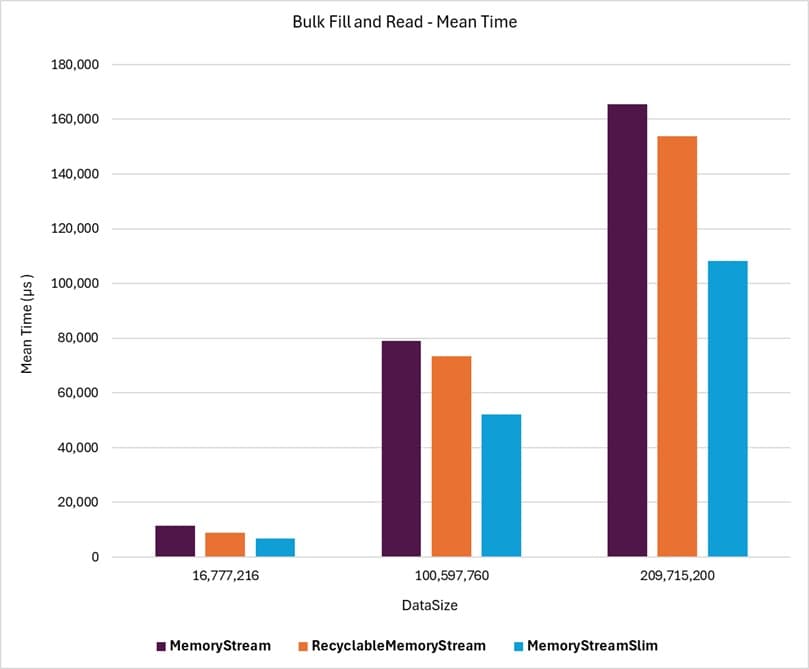MemoryStream Benchmarks
As previously mentioned, the general goals and approach to easing GC pressure and reducing memory traffic are the same for both MemoryStreamSlim and RecyclableMemoryStream. For benchmarking purposes, the standard MemoryStream class, RecyclableMemoryStream, and MemoryStreamSlim are compared side-by-side for performance across various use cases.
In all cases, the benchmark values for the MemoryStream class are used as the baseline for comparison. The RecyclableMemoryStream and MemoryStreamSlim classes are then compared to the MemoryStream class to determine the performance and memory allocation differences for each set of benchmark parameters.
Example
The following graph shows a portion of the results from the Bulk Fill And Read benchmarks, showing that MemoryStreamSlim achieves mean time throughput superior to the standard MemoryStream while significantly outperforming RecyclableMemoryStream. More details can be found in the various benchmark discussion pages.

Benchmark Scenarios
The benchmark scenarios are categorized into five groups:
Dynamic Throughput
Benchmarks using dynamically expandable streams instantiated with an initial zero length. Read More
CopyToAsync Throughput
Benchmarks demonstrating the performance impact of copying the contents of a stream to another stream asynchronously. Read More
Wrapper Throughput
Benchmarks for streams instantiated with an already allocated and available byte array to evaluate "fixed" mode (wrapped arrray) behavior. Read More
Reading Results
Parameter Effect
Not every parameter used in the benchmarks applies to every class being compared. For example, the MemoryStream class does not have an option to zero out memory buffers, as this is its default and only behavior.
Two considerations apply in such cases:
- The MemoryStream class operations are run for every parameter scenario, even when the ZeroBuffers parameter is not applicable, to make the results easy to read and compare side by side with other classes.
- Benchmark results where ZeroBuffers is set to true provide a more accurate comparison between the different classes. However, results where ZeroBuffers is set to false highlight the performance gains achievable by not zeroing out memory buffers for non-sensitive data streams.
Specific parameter values with similar caveats are noted in the descriptions of the respective benchmark scenarios.
Loop Count Impact
To keep benchmark operation times reasonable and measurable, many benchmark operations are run with a small loop of repeated steps. This ensures the benchmark operation times are neither too short to be unreliable nor excessively long.
Legend
The following are the standard BenchmarkDotNet columns found in the benchmark results. Each benchmark scenario describes the parameter value meanings for its specific benchmark runs.
| Column | Description |
|---|---|
| Mean | Arithmetic mean of all measurements |
| Error | Half of 99.9% confidence interval |
| StdDev | Standard deviation of all measurements |
| Median | Value separating the higher half of all measurements (50th percentile) |
| Ratio | Mean of the ratio distribution ([Current]/[Baseline]) |
| RatioSD | Standard deviation of the ratio distribution ([Current]/[Baseline]) |
| Gen0 | GC Generation 0 collects per 1000 operations |
| Gen1 | GC Generation 1 collects per 1000 operations |
| Gen2 | GC Generation 2 collects per 1000 operations |
| Allocated | Allocated memory per single operation (managed only, inclusive, 1KB = 1024B) |
| Alloc Ratio | Allocated memory ratio distribution ([Current]/[Baseline]) |
| 1 μs | 1 Microsecond (0.000001 sec) |
| 1 ms | 1 Millisecond (0.001 sec) |
HTML Reports
Since the benchmark results can create large tables that may be difficult to navigate due to horizontal and vertical scrolling, the results are also provided in separate HTML files for each scenario.
Versions
The benchmarks published here used the following versions of the libraries:
BenchmarkDotNetversion: 0.14.0KZDev.PerfUtilsversion: 2.0.0RecyclableMemoryStreamversion: 3.0.1MemoryStreamversion: .NET 9.0.4